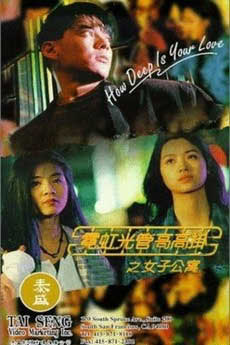How Deep is Your Love

Reviewed by YTSL
For better or worse, this 1994 offering is the
kind of Hong Kong movie that would not be made in Hollywood or find too receptive
an audience outside of its home region. While those with or used to
Hong Kong sensibilities will find this pop music laden piece to generally
be a relatively innocuous and even sweet offering, I feel obliged to point
out that it contains a lot of material that might offend lots of different,
less prepared and thin-skinned people.

More specifically: I can imagine homophobic individuals being upset
by HOW DEEP IS YOUR LOVE having so many -- and frequently nice or at least
harmless -- homosexual characters; even while gay activists might get equally
upset by this being one of those romantic works which features what will
probably be seen as a conversion to heterosexuality (Alternatively though,
one could argue that it all makes for an implicit and prevailing assumption
that quite a few people actually have bisexual tendencies; hence their going
for the same or opposite sex at different times in their lives). Then
there's the depiction of non-Chinese folk here, along with someone's Cantonese-language
nickname of Black Ghost getting translated by the film's English subtitlers
as Negro (At the risk of sounding like an apologist, I will point out that
the character in question IS Chinese AND not portrayed as bad. Instead,
he probably owes his nickname to being like the popular actor, Lau Ching
Wan, in having a darker shade of skin than many other Chinese persons).
 In all honesty, I sincerely doubt that anyone involved
with this production -- whose story centers on a young woman named Ken (played
by the beguiling Charlie Yeung. N.B. For those who are unfamiliar with
this prematurely retired talent, Charlie is very much a "she") returning
to Hong Kong after nine years away upon the death of her brother to settle
his affairs and belatedly learn more about him (and his friends) -- were
going out to get anyone's goat. Actually, for that matter, I don't
think that the makers of a movie whose English title is taken from the Bee
Gees song that gets ample playing time here were aiming to make any particularly
deep points and serious statements.
In all honesty, I sincerely doubt that anyone involved
with this production -- whose story centers on a young woman named Ken (played
by the beguiling Charlie Yeung. N.B. For those who are unfamiliar with
this prematurely retired talent, Charlie is very much a "she") returning
to Hong Kong after nine years away upon the death of her brother to settle
his affairs and belatedly learn more about him (and his friends) -- were
going out to get anyone's goat. Actually, for that matter, I don't
think that the makers of a movie whose English title is taken from the Bee
Gees song that gets ample playing time here were aiming to make any particularly
deep points and serious statements.

Nevertheless, as the notoriously negative Paul Fonoroff actually positively
pointed out in his "At the Hong Kong Movies" book: "[D]irector Andy
Chin seems to cut through some of the stereotypes and prejudices" found elsewhere;
"Carbon Cheung's script allows for a cross section of women, of different
races, sexual persuasions, and personalities, that is refreshing in the often
humdrum world of standardized characters"; and the thorn among the roses,
Max Mok, successfully invested his character, Joe, "with nuance and a natural
quality that makes him the first mainstream Cantonese movie gay romantic
lead to not be a caricature" (1998:425-426). Indeed, what we essentially
have in HOW DEEP IS YOUR LOVE is a pleasantly idealistic depiction of a diverse
group of -- imperfect yet not at all charmless -- youth who live in communal
housing in low-cost Mirador Mansions (Chungking Mansions's less-famous neighbor)
and the people they regularly interact with on a social and business level.

All in all, this is a low-key, leisurely-paced effort which has the good
fortune to star two winning actresses (Charlie Yeung in her first year in
the movie business; and Wu Chien-Lien in a supporting role as a Taiwanese
singer which hardly stretched her since she does hail from Taiwan and has
a music as well as film career) along with an actor who I am surprised has
never graduated to the Hong Kong movie A list (Max Mok did appear though
in "Once Upon a Time in China" II and III, and -- in the same year as this
film -- romanced the surely at least one decade older Brigitte Lin in "Fire
Dragon"). As such, while HOW DEEP IS YOUR LOVE is hardly a "must see"
work, neither does it really deserve to be a "must avoid".

My rating for the film: 6.5.






